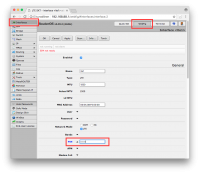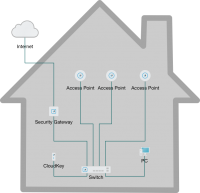See how-to instructions and a video in another article.
This script was written for Google Cloud Platform and Debian. It should be fairly straightforward to port to any other cloud platform. They have a similar way of accessing virtual machine metadata. The only other GCP specific function is gsutil rsync in the backup script.
Porting to other Linux distributions or Unices would take some more effort. If the destination system doesn’t use systemd then the services and timers should be rewritten. The script also uses apt-get to install packages, but that is fairly easy to edit. Ubiquiti only provides a dpkg package for the controller, though.
I have tried to write the script in open style without shortcuts. A lot of the ifs could be streamlined, but I value legibility. The resulting system is also easy to reconfigure, if you are familiar with Unix command line. The list of files is at the end of the article.
#
# Set up logging for unattended scripts and UniFi's MongoDB log
# Variables $LOG and $MONGOLOG are used later on in the script.
#
LOG="/var/log/unifi/gcp-unifi.log"
if [ ! -f /etc/logrotate.d/gcp-unifi.conf ]; then
cat > /etc/logrotate.d/gcp-unifi.conf <<_EOF
$LOG {
monthly
rotate 4
compress
}
_EOF
echo "Script logrotate set up"
fi
MONGOLOG="/usr/lib/unifi/logs/mongod.log"
if [ ! -f /etc/logrotate.d/unifi-mongod.conf ]; then
cat > /etc/logrotate.d/unifi-mongod.conf <<_EOF
$MONGOLOG {
weekly
rotate 10
copytruncate
delaycompress
compress
notifempty
missingok
}
_EOF
echo "MongoDB logrotate set up"
fi
Although most users won’t ever log on to the virtual machine, I still find it worthwhile to write a log. This log will only contain unattended script actions like database repairs or certificate updates every 3 months or so. Not much volume, but it is still good practice to set up logrotate. Four months will cover the last certificate update. For some reason Ubiquiti doesn’t set up logrotate for their MongoDB instance so we’ll cover that as well.
# # Turn off IPv6 for now # if [ ! -f /etc/sysctl.d/20-disableIPv6.conf ]; then echo "net.ipv6.conf.all.disable_ipv6=1" > /etc/sysctl.d/20-disableIPv6.conf sysctl --system > /dev/null echo "IPv6 disabled" fi
I found out that occasionally the UniFi controller will try to bind to IPv6 only. GCP doesn’t route IPv6 to the virtual machines at this time, so we can just as well turn it off.
#
# Update DynDNS as early in the script as possible
#
ddns=$(curl -fs -H "Metadata-Flavor: Google" "http://metadata.google.internal/computeMetadata/v1/instance/attributes/ddns-url")
if [ ${ddns} ]; then
curl -fs ${ddns}
echo "Dynamic DNS accessed"
fi
If the user supplied a dynamic DNS service URL we’ll call it as early as possible so the DNS has a couple of minutes to settle before we’ll need it for Let’s Encrypt certificate at the end of the script.
#
# Create a swap file for small memory instances and increase /run
#
if [ ! -f /swapfile ]; then
memory=$(free -m | grep "^Mem:" | tr -s " " | cut -d " " -f 2)
echo "${memory} megabytes of memory detected"
if [ -z ${memory} ] || [ "0${memory}" -lt "2048" ]; then
fallocate -l 2G /swapfile
chmod 600 /swapfile
mkswap /swapfile >/dev/null
swapon /swapfile
echo '/swapfile none swap sw 0 0' >> /etc/fstab
echo 'tmpfs /run tmpfs rw,nodev,nosuid,size=400M 0 0' >> /etc/fstab
mount -o remount,rw,nodev,nosuid,size=400M tmpfs /run
echo "Swap file created"
fi
fi
If the memory of the virtual machine is less than 2GB (or we can’t find out) we’ll create a 2GB swap file and register it on /etc/fstab. The size of default tmpfs mounted at /run also depends on the amount of memory. On a small machine /run may be too small to create backups so we’ll set it to 400M. Tmpfs will be swapped out as needed, so it won’t consume real memory.
#
# Set the time zone
#
tz=$(curl -fs -H "Metadata-Flavor: Google" "http://metadata.google.internal/computeMetadata/v1/instance/attributes/timezone")
if [ ${tz} ] && [ -f /usr/share/zoneinfo/${tz} ]; then
apt-get -qq install -y dbus >/dev/null
if ! systemctl start dbus; then
echo "Trying to start dbus"
sleep 15
systemctl start dbus
fi
if timedatectl set-timezone $tz; then echo "Localtime set to ${tz}"; fi
systemctl reload-or-restart rsyslog
fi
If the user supplied a timezone reference we’ll check whether it exists on Debian. To set the timezone properly we need DBus. It is finicky and often won’t start on first try. We retry right away and if needed a third time 15 seconds later. RSysLog is already running but it needs to be made aware of the new local time.
# # Add Unifi to APT sources # if [ ! -f /etc/apt/trusted.gpg.d/unifi-repo.gpg ]; then echo "deb http://www.ubnt.com/downloads/unifi/debian stable ubiquiti" > /etc/apt/sources.list.d/unifi.list curl -Lfs -o /etc/apt/trusted.gpg.d/unifi-repo.gpg https://dl.ubnt.com/unifi/unifi-repo.gpg echo "Unifi added to APT sources"; fi
If the file doesn’t exist we’ll add the Ubiquiti repo and its GPG key to APT sources.
#
# Add backports if it doesn't exist
#
release=$(lsb_release -a 2>/dev/null | grep "^Codename:" | cut -f 2)
if [ ${release} ] && [ ! -f /etc/apt/sources.list.d/backports.list ]; then
cat > /etc/apt/sources.list.d/backports.list <<_EOF
deb http://deb.debian.org/debian/ ${release}-backports main
deb-src http://deb.debian.org/debian/ ${release}-backports main
_EOF
echo "Backports (${release}) added to APT sources"
fi
CertBot should be installed from the backports repo. The repo definition needs the codename for the release, so we need to figure it out first. Google provided images should contain this by default, but we’ll check for it just in case.
# # Install stuff # if [ ! -f /usr/share/misc/apt-upgraded ]; then apt-get -qq update -y >/dev/null apt-get -qq upgrade -y >/dev/null touch /usr/share/misc/apt-upgraded echo "System upgraded" fi
Update the APT package list and upgrade the system to the latest on the first run only. We’ll leave a flag file in /var/share/misc so the next boots won’t be delayed. Unattended Upgrades will keep the system up to date on a daily basis.
haveged=$(dpkg-query -W --showformat='${Status}\n' haveged 2>/dev/null)
if [ "x${haveged}" != "xinstall ok installed" ]; then
if apt-get -qq install -y haveged >/dev/null; then
echo "Haveged installed"
fi
fi
Haveged provides entropy for the random number generator needed for encryption. Cloud based virtual machines don’t have access to entropy sources like ordinary computers do, which may delay booting 30 minutes or more.
certbot=$(dpkg-query -W --showformat='${Status}\n' certbot 2>/dev/null)
if [ "x${certbot}" != "xinstall ok installed" ]; then
if (apt-get -qq install -y -t ${release}-backports certbot >/dev/null) || (apt-get -qq install -y certbot >/dev/null); then
echo "CertBot installed"
fi
fi
CertBot is the tool to acquire and renew Let’s Encrypt certificates. According to EFF docs it should be installed from backports, but this occasionally gives errors. We try the backports first and then the default repos if it fails.
unifi=$(dpkg-query -W --showformat='${Status}\n' unifi 2>/dev/null)
if [ "x${unifi}" != "xinstall ok installed" ]; then
if apt-get -qq install -y unifi >/dev/null; then
echo "Unifi installed"
fi
systemctl stop mongodb
systemctl disable mongodb
fi
UniFi Controller is the beef.
UniFi Controller will install and enable MongoDB, even though the service is never used. UniFi Controller will start its own MongoDB instance instead. By stopping and disabling the stock MongoDB we’ll save some memory and processor cycles.
httpd=$(dpkg-query -W --showformat='${Status}\n' lighttpd 2>/dev/null)
if [ "x${httpd}" != "xinstall ok installed" ]; then
if apt-get -qq install -y lighttpd >/dev/null; then
cat > /etc/lighttpd/conf-enabled/10-unifi-redirect.conf <<_EOF
\$HTTP["scheme"] == "http" {
\$HTTP["host"] =~ ".*" {
url.redirect = (".*" => "https://%0:8443")
}
}
_EOF
systemctl reload-or-restart lighttpd
echo "Lighttpd installed"
fi
fi
Install Lighttpd and configure it to redirect plain http requests to https on port 8443. Lighttpd needs to be reloaded after the configuration change.
f2b=$(dpkg-query -W --showformat='${Status}\n' fail2ban 2>/dev/null)
if [ "x${f2b}" != "xinstall ok installed" ]; then
if apt-get -qq install -y fail2ban >/dev/null; then
echo "Fail2Ban installed"
fi
if [ ! -f /etc/fail2ban/filter.d/unifi-controller.conf ]; then
cat > /etc/fail2ban/filter.d/unifi-controller.conf <<_EOF
[Definition]
failregex = ^.* Failed .* login for .* from \s*$
_EOF
cat > /etc/fail2ban/jail.d/unifi-controller.conf <<_EOF
[unifi-controller]
filter = unifi-controller
port = 8443
logpath = /var/log/unifi/server.log
_EOF
fi
# The .local file will be installed in any case cat > /etc/fail2ban/jail.d/unifi-controller.local <<_EOF
[unifi-controller]
enabled = true
maxretry = 3
bantime = 3600
findtime = 3600
_EOF
systemctl reload-or-restart fail2ban
fi
Fail2Ban will protect the controller from brute-force login attacks. We need three files for it: the filter contains the regex, the jail file contains the generic settings and the local jail file for local setup. The two latter could be combined but I have submitted the first two upstream to Fail2Ban maintainers. If they are accepted they will eventually be installed automatically. Then we only need to create the local jail file.
#
# Set up unattended upgrades after 04:00 with automatic reboots
#
if [ ! -f /etc/apt/apt.conf.d/51unattended-upgrades-unifi ]; then
cat > /etc/apt/apt.conf.d/51unattended-upgrades-unifi <<_EOF
Acquire::AllowReleaseInfoChanges "true";
Unattended-Upgrade::Origins-Pattern {
"o=Debian,a=stable";
"c=ubiquiti";
};
Unattended-Upgrade::Remove-Unused-Dependencies "true";
Unattended-Upgrade::Automatic-Reboot "true";
_EOF
cat > /etc/systemd/system/timers.target.wants/apt-daily-upgrade.timer <<_EOF
[Unit]
Description=Daily apt upgrade and clean activities
After=apt-daily.timer
[Timer]
OnCalendar=4:00
RandomizedDelaySec=30m
Persistent=true
[Install]
WantedBy=timers.target
_EOF
systemctl daemon-reload
systemctl reload-or-restart unattended-upgrades
echo "Unattended upgrades set up"
fi
By Google default only the security updates are installed automatically. This file will add all Debian stable updates and Ubiquiti updates to the automatic update schedule. If the update requires a restart or reboot, it will occur after 04:00 local time. This is the reason for setting the timezone.
#
# Set up automatic repair for broken MongoDB on boot
#
if [ ! -f /usr/local/sbin/unifidb-repair.sh ]; then
cat > /usr/local/sbin/unifidb-repair.sh <<_EOF
#! /bin/sh
if ! pgrep mongod; then
if [ -f /var/lib/unifi/db/mongod.lock ] \
|| [ -f /var/lib/unifi/db/WiredTiger.lock ] \
|| [ -f /var/run/unifi/db.needsRepair ] \
|| [ -f /var/run/unifi/launcher.looping ]; then
if [ -f /var/lib/unifi/db/mongod.lock ]; then rm -f /var/lib/unifi/db/mongod.lock; fi
if [ -f /var/lib/unifi/db/WiredTiger.lock ]; then rm -f /var/lib/unifi/db/WiredTiger.lock; fi
if [ -f /var/run/unifi/db.needsRepair ]; then rm -f /var/run/unifi/db.needsRepair; fi
if [ -f /var/run/unifi/launcher.looping ]; then rm -f /var/run/unifi/launcher.looping; fi
echo >> $LOG
echo "Repairing Unifi DB on \$(date)" >> $LOG
su -c "/usr/bin/mongod --repair --dbpath /var/lib/unifi/db --logappend --logpath ${MONGOLOG} 2>>$LOG" unifi
fi
else
echo "MongoDB is running. Exiting..."
exit 1
fi
exit 0
_EOF
chmod a+x /usr/local/sbin/unifidb-repair.sh
cat > /etc/systemd/system/unifidb-repair.service <<_EOF
[Unit]
Description=Repair UniFi MongoDB database at boot
Before=unifi.service mongodb.service
After=network-online.target
Wants=network-online.target
[Service]
Type=oneshot
ExecStart=/usr/local/sbin/unifidb-repair.sh
[Install]
WantedBy=multi-user.target
_EOF
systemctl enable unifidb-repair.service
echo "Unifi DB autorepair set up"
fi
This section will create a script to in /usr/local/sbin to repair MongoDB if necessary. Then it will create a system.d unit to launch the script at every boot before Unifi and MongoDB are started.
In the script the first condition checks if MongoDB is running. The script should be run by systemd at boot before UniFi is started, but the check is there just in case someone runs this as a command. The script is executable by anyone and /usr/local/sbin is in root’s path so this is a possibility.
If the MongoDB is shut down improperly it will leave lock files, which indicate a repair operation is needed. UniFi controller may add flag files that the startup is looping or the database is broken. If any of these files is found, they are all removed and MongoDB repair is attempted.
At last we’ll create the unit file for a service and enable it so this will be run automatically at boot.
#
# Set up daily backup to a bucket after 01:00
#
bucket=$(curl -fs -H "Metadata-Flavor: Google" "http://metadata.google.internal/computeMetadata/v1/instance/attributes/bucket")
if [ ${bucket} ]; then
cat > /etc/systemd/system/unifi-backup.service <<_EOF
[Unit] Description=Daily backup to ${bucket}
service After=network-online.target
Wants=network-online.target
[Service] Type=oneshot
ExecStart=/usr/bin/gsutil rsync -r -d /var/lib/unifi/backup gs://$bucket
_EOF
cat > /etc/systemd/system/unifi-backup.timer <<_EOF
[Unit]
Description=Daily backup to ${bucket} timer
[Timer]
OnCalendar=1:00
RandomizedDelaySec=30m
[Install]
WantedBy=timers.target
_EOF
systemctl daemon-reload
systemctl start unifi-backup.timer
echo "Backups to ${bucket} set up"
fi
If the user has specified a bucket we’ll create two systemd unit files. One for a timer to run once a day and a service to actually execute the rsync command.
The unit files are rewritten at every boot in case the user has changed the destination bucket. One could argue that there is no point in enabling the service, since it is also started at every boot. Enabling does very little harm and perhaps one day the script isn’t loaded for some error.
#
# Set up Let's Encrypt
#
dnsname=$(curl -fs -H "Metadata-Flavor: Google" "http://metadata.google.internal/computeMetadata/v1/instance/attributes/dns-name")
if [ -z ${dnsname} ]; then exit 0; fi
privkey=/etc/letsencrypt/live/${dnsname}/privkey.pem
pubcrt=/etc/letsencrypt/live/${dnsname}/cert.pem
chain=/etc/letsencrypt/live/${dnsname}/chain.pem
caroot=/usr/share/misc/ca_root.pem
Setting up Let’s Encrypt reliably turned out to be messy. At first we check whether the user supplied a DNS name and if not then we are done. We also set some file paths for shorthand.
if [ ! -f $caroot ]; then cat > $caroot <<_EOF -----BEGIN CERTIFICATE----- MIIDSjCCAjKgAwIBAgIQRK+wgNajJ7qJMDmGLvhAazANBgkqhkiG9w0BAQUFADA/ MSQwIgYDVQQKExtEaWdpdGFsIFNpZ25hdHVyZSBUcnVzdCBDby4xFzAVBgNVBAMT DkRTVCBSb290IENBIFgzMB4XDTAwMDkzMDIxMTIxOVoXDTIxMDkzMDE0MDExNVow PzEkMCIGA1UEChMbRGlnaXRhbCBTaWduYXR1cmUgVHJ1c3QgQ28uMRcwFQYDVQQD Ew5EU1QgUm9vdCBDQSBYMzCCASIwDQYJKoZIhvcNAQEBBQADggEPADCCAQoCggEB AN+v6ZdQCINXtMxiZfaQguzH0yxrMMpb7NnDfcdAwRgUi+DoM3ZJKuM/IUmTrE4O rz5Iy2Xu/NMhD2XSKtkyj4zl93ewEnu1lcCJo6m67XMuegwGMoOifooUMM0RoOEq OLl5CjH9UL2AZd+3UWODyOKIYepLYYHsUmu5ouJLGiifSKOeDNoJjj4XLh7dIN9b xiqKqy69cK3FCxolkHRyxXtqqzTWMIn/5WgTe1QLyNau7Fqckh49ZLOMxt+/yUFw 7BZy1SbsOFU5Q9D8/RhcQPGX69Wam40dutolucbY38EVAjqr2m7xPi71XAicPNaD aeQQmxkqtilX4+U9m5/wAl0CAwEAAaNCMEAwDwYDVR0TAQH/BAUwAwEB/zAOBgNV HQ8BAf8EBAMCAQYwHQYDVR0OBBYEFMSnsaR7LHH62+FLkHX/xBVghYkQMA0GCSqG SIb3DQEBBQUAA4IBAQCjGiybFwBcqR7uKGY3Or+Dxz9LwwmglSBd49lZRNI+DT69 ikugdB/OEIKcdBodfpga3csTS7MgROSR6cz8faXbauX+5v3gTt23ADq1cEmv8uXr AvHRAosZy5Q6XkjEGB5YGV8eAlrwDPGxrancWYaLbumR9YbK+rlmM6pZW87ipxZz R8srzJmwN0jP41ZL9c8PDHIyh8bwRLtTcm1D9SZImlJnt1ir/md2cXjbDaJWFBM5 JDGFoqgCWjBH4d1QB7wCCZAA62RjYJsWvIjJEubSfZGL+T0yjWW06XyxV3bqxbYo Ob8VZRzI9neWagqNdwvYkQsEjgfbKbYK7p2CNTUQ -----END CERTIFICATE----- _EOF fi
This cross-signed certificate is required for the import process. You should check it matches the original (courtesy of Steve Jenkins).
Next we’ll write a deploy hook that CertBot will automatically run every time it has renewed a certificate. We need to massage and then import the new certificate to Java keystore for UniFi.
if [ ! -d /etc/letsencrypt/renewal-hooks/deploy ]; then
mkdir -p /etc/letsencrypt/renewal-hooks/deploy
fi
cat > /etc/letsencrypt/renewal-hooks/deploy/unifi <<_EOF
#! /bin/sh
if [ -e $privkey ] && [ -e $pubcrt ] && [ -e $chain ]; then
echo >> $LOG
echo "Importing new certificate on \$(date)" >> $LOG
p12=\$(mktemp)
if ! openssl pkcs12 -export \\
-in $pubcrt \\
-inkey $privkey \\
-CAfile $chain \\
-out \${p12} -passout pass:aircontrolenterprise \\
-caname root -name unifi >/dev/null ; then
echo "OpenSSL export failed" >> $LOG
exit 1
fi
if ! keytool -delete -alias unifi \\
-keystore /var/lib/unifi/keystore \\
-deststorepass aircontrolenterprise >/dev/null ; then
echo "KeyTool delete failed" >> $LOG
fi
if ! keytool -importkeystore \\
-srckeystore \${p12} -srcstoretype PKCS12 \\
-srcstorepass aircontrolenterprise \\
-destkeystore /var/lib/unifi/keystore \\
-deststorepass aircontrolenterprise \\
-destkeypass aircontrolenterprise \\
-alias unifi -trustcacerts >/dev/null; then
echo "KeyTool import failed" >> $LOG
exit 2
fi
systemctl stop unifi
if ! java -jar /usr/lib/unifi/lib/ace.jar import_cert \\
$pubcrt $chain $caroot >/dev/null; then
echo "Java import_cert failed" >> $LOG
systemctl start unifi
exit 3
fi
systemctl start unifi
rm -f \${p12}
echo "Success" >> $LOG
else
echo "Certificate files missing" >> $LOG
exit 4
fi
_EOF
chmod a+x /etc/letsencrypt/renewal-hooks/deploy/unifi
There are many steps where this may fail. The exit codes and the log will hint what went wrong. It is still important to restart the UniFi controller to be of any service. The only error which won’t cause premature exit is keytool delete. If it fails, then most of the time the keytool import will also fail, causing exit.
Next we’ll create a script in /usr/local/sbin to run the CertBot. This way we can use it in a timer if we don’t succeed the first time:
cat > /usr/local/sbin/certbotrun.sh <<_EOF
#! /bin/sh
extIP=\$(curl -fs -H "Metadata-Flavor: Google" "http://metadata.google.internal/computeMetadata/v1/instance/network-interfaces/0/access-configs/0/external-ip")
dnsIP=\$(getent hosts ${dnsname} | cut -d " " -f 1)
echo >> $LOG
echo "CertBot run on \$(date)" >> $LOG
if [ \${extIP} = \${dnsIP} ]; then
if [ ! -d /etc/letsencrypt/live/${dnsname} ]; then
systemctl stop lighttpd
if certbot certonly -d $dnsname --standalone --agree-tos --register-unsafely-without-email >> $LOG; then
echo "Received certificate for ${dnsname}" >> $LOG
fi
systemctl start lighttpd
fi
if /etc/letsencrypt/renewal-hooks/deploy/unifi; then
systemctl stop certbotrun.timer
echo "Certificate installed for ${dnsname}" >> $LOG
fi
else
echo "No action because ${dnsname} doesn't resolve to ${extIP}" >> $LOG
fi
_EOF
chmod a+x /usr/local/sbin/certbotrun.sh
First we need to figure out the external IP of the VM and the IP address of the user-supplied DNS name. If they match and we don’t yet have a certificate for the domain, we’ll try. We need to shutdown Lighttpd for the time because CertBot may need port 80 as well. If we succeed we need to run the deploy hook manually, since it is run automatically only for renewals. In case this was a timer job, we’ll stop the timer after success.
If we don’t succeed on the first try, we’ll run the CertBot once an hour as a timer job. This requires two unit files and a systemd reload:
cat > /etc/systemd/system/certbotrun.timer <<_EOF [Unit] Description=Run CertBot hourly until success [Timer] OnCalendar=hourly RandomizedDelaySec=15m [Install] WantedBy=timers.target _EOF systemctl daemon-reload cat > /etc/systemd/system/certbotrun.service <<_EOF [Unit] Description=Run CertBot hourly until success After=network-online.target Wants=network-online.target [Service] Type=oneshot ExecStart=/usr/local/sbin/certbotrun.sh _EOF
This short part will set the Let’s Encrypt machinery rolling:
if [ ! -d /etc/letsencrypt/live/${dnsname} ]; then
if ! /usr/local/sbin/certbotrun.sh; then
echo "Installing hourly CertBot run"
systemctl start certbotrun.timer
fi
fi
If there is no certificate yet, we’ll run the script manually. If it fails, we’ll start the timer.
List of files
These files are created or modified by the script. You can edit these to your needs once the system is up. In the order of appearance:
- /etc/logrotate.d/gcp-unifi.conf
- /etc/logrotate.d/unifi-mongod.conf
- /etc/sysctl.d/20-disableIPv6.conf
- /etc/fstab
- /etc/apt/sources.list.d/unifi.list
- /etc/apt/sources.list.d/backports.list
- /etc/lighttpd/conf-enabled/10-unifi-redirect.conf
- /etc/fail2ban/filter.d/unifi-controller.conf
- /etc/fail2ban/jail.d/unifi-controller.conf
- /etc/fail2ban/jail.d/unifi-controller.local
- /etc/apt/apt.conf.d/51unattended-upgrades-unifi
- /etc/systemd/system/timers.target.wants/apt-daily-upgrade.timer
- /usr/local/sbin/unifidb-repair.sh
- /etc/systemd/system/unifidb-repair.service
- /etc/systemd/system/unifi-backup.service (*)
- /etc/systemd/system/unifi-backup.timer (*)
- # /var/lib/unifi/system.properties (*)
- /etc/letsencrypt/renewal-hooks/deploy/unifi (*)
- /usr/local/sbin/certbotrun.sh (*)
- /etc/systemd/system/certbotrun.timer
- /etc/systemd/system/certbotrun.service
The starred files are rewritten at every boot if bucket or dnsname metadata fields are defined. If you want to edit them you need to remove the startup-script-url from the metadata.
System.properties file will be edited in place for xms and xmx (once Ubiquiti fixes a bug). You can edit other lines as required.
















